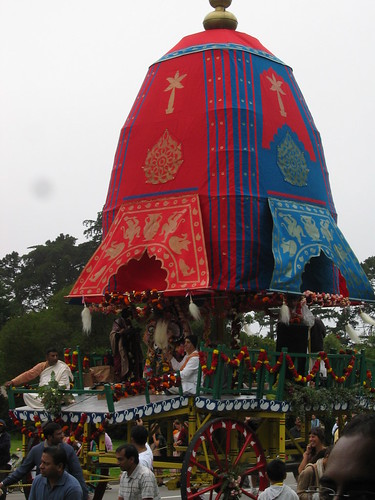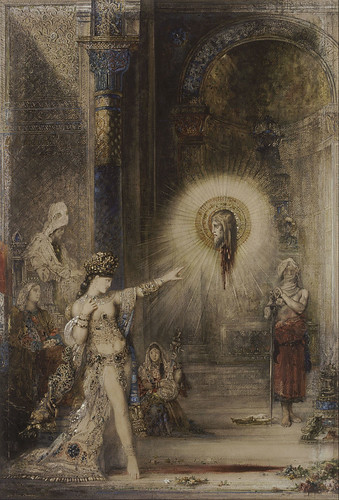[Photo: CC BY-SA 2.0 by James Vaughn]
Updated.
Welcome to Word Soup Wednesday, in which we bring you our favorite strange, obscure, unbelievable (and sometimes NSFW) words from sitcoms, dramas, news shows, and just about anything else on TV.
baldy house
Anthony Bourdain: “I gotta know: why do they call it a baldy house?”
Guide: “It was believed, sort of incorrectly, that if you shave a woman’s crotch bald, she’d be less likely to transmit crabs.”
“Philadelphia,” The Layover, December 3, 2012
A baldy house is a brothel and may be a play on bawdyhouse. Brothel comes from an Old English word meaning “to decay,” and at first referred to “a wretch” or “lewd man or woman.” Bawdy may come from a Welsh word meaning “mud.”
Belsnickel
Dwight: “What about an authentic Pennsylvania Dutch Christmas? Drink some gluhwein, enjoy some hossenfeffer. Enjoy Christmas with St. Nicholas’s rural German companion, Belsnickel?”
“Dwight Christmas,” The Office, December 6, 2012
Belsnickel is “a crotchety, fur-clad Christmas gift-bringer figure in the folklore of the Palatinate region of southwestern Germany,” and is “preserved in Pennsylvania Dutch communities.” The name comes from the German pelz, “to pelt,” and the name Nikolaus. See also Krampus.
filibuster
Shep Smith: “You know that one friend who just won’t let you get a word in edgewise? Well, the U.S. Senate has a friend like that. His name is filibuster.”
Jon Stewart: “And you know that one friend who comes to where you live and rearranges your stuff? Gerrymander.”
The Daily Show with Jon Stewart, December 3, 2012
Filibuster is “the use of obstructionist tactics, especially prolonged speechmaking, for the purpose of delaying legislative action.” The word originally referred to “an adventurer who engages in a private military action in a foreign country,” specifically “the West Indian bucaneers or pirates of the seventeenth century.” Filibuster ultimately comes from the Dutch vrijbuiter, “pirate.”
flaneur
Woman: “The word ‘flaneur’ in French is just to kind of wander. Here it’s okay to just be a flaneur and to dream and to walk along and then stop in a cafe.”
“Paris,” The Layover, November 26, 2012
A flaneur is “an idle, gossiping saunterer; one who habitually strolls about idly.” The word is French in origin.
geophagy
Sabrina: “It’s called geophagy. I sense you have questions. Go ahead.”
Burt: “Do you wash your hands before you eat dirt? If it falls on the ground, is there a five second rule? Have you ever tried sand?”
“Squeak Means Squeak,” Raising Hope, December 4, 2012
Geophagy is “the eating of earthy substances, such as clay or chalk, practiced among various peoples as a custom or for dietary or subsistence reasons,” and is a combination of the Greek words for “earth” and “eat.”
Pica is “an abnormal craving or appetite for nonfood substances, such as dirt, paint, or clay,” and comes from the Latin word for magpie, “from its omnivorous nature.”
granny pod
Newscaster: “We’re checking out a business that makes granny pods. . . . They’re long term care housing options for the elderly. They’re portable. They can be set up right on your property, in your backyard if you want.”
The Colbert Report, December 3, 2012
Pod meaning “a casing or housing forming part of a vehicle” originated around 1950, says the Oxford English Dictionary. The earliest meaning was “in botany, a more or less elongated cylindrical or flatfish seed-vessel, as of the pea, bean, catalpa.”
guillotine
Anthony Bourdain: “Maurice and I catch up with a cold rosé and a snack called a guillotine, thin slices of bread with equally thin slices of meat and cheese. Simple and good.”
“Paris,” The Layover, November 26, 2012
The guillotine, “a device consisting of a heavy blade held aloft between upright guides and dropped to behead the victim below,” or “an instrument, such as a paper cutter, similar in action to a guillotine.”
The device was named for Joseph Guillotin, who “proposed, for humanitarian and efficiency reasons, that capital punishment be carried out by beheading quickly and cleanly on a machine.”
Perhaps the snack is named for the device that slices the meat, cheese, and bread.
hog maw
Kevin: “I love this hog mama.”
Phyllis: “Dwight said it’s hog maw.”
Kevin: “What’s maw?”
Phyllis: “It’s the lining of the stomach of the pig.”
“Dwight Christmas,” The Office, December 6, 2012
The maw of hog maw comes from the Old English maga, “stomach.” Hackin is “a pudding made in the maw of a sheep or hog,” and seems similar to haggis.
housewife
Jon Stewart: “[Congresswoman Candice Miller] will be the chair of the House Administration Committee, whose responsibilities apparently range from ‘making Congress more open and accessible’ to ‘ensuring the House runs efficiently and smoothly.’ So we’ve got a woman to be, to coin a phrase, the House wife.”
The Daily Show with Jon Stewart, December 4, 2012
A housewife is “a woman who manages her own household as her main occupation.” The word hussy, “a woman considered brazen or immoral,” is an alteration of housewife, and originally had the same meaning, “the mistress of the house.”
hyperemesis gravidarum
Jon Stewart: “While morning sickness may be all right for commoners, the royals puke fancy.”
Newcaster: “[Kate Middleton is] suffering from what is called hyperemesis gravidarum.”
Jon Stewart: “Isn’t that the spell they used to defeat Voldemort?”
The Daily Show with Jon Stewart, December 6, 2012
Hyperemesis is “excessive vomiting” while gravidarum means “during pregnancy.” Gravid is a clinical term for being pregnant, and comes from the Latin gravis, “heavy.”
merkin
Guide: “They actually didn’t want the women to be shaven bald. That meant you were either underage or a prostitute. So they would make them wear crotch wigs.”
Anthony: “Crotch wigs known as a merkin. Why I know this, I don’t know.”
“Philadelphia,” The Layover, December 3, 2012
Merkin is probably an alteration of malkin, “a kitchen servant, or any common woman; a slattern,” or “a mop.”
rexie
Jake [regarding Marley]: “She hasn’t been eating. She’s been skipping lunch.”
Santana [to Kitty]: “Because you’ve been telling her to? You’ve been trying to turn her into a damned rexie?”
“Swan Song,” Glee, December 6, 2012
Rexie refers to someone who views having anorexia nervosa as attractive and admirable. A synonym is pro-ana, or pro-anorexia. Rexie may be a blend of anorexia and sexy.
vagenius
Sadie: “Schmidt, in my professional opinion, you have definitely earned the rank of, and I will use a phrase you coined, vagenius.”
“Eggs,” New Girl, November 27, 2012
Vagenius is a blend of vagina and genius, and refers to someone adept pleasuring a woman.
And on that note, that’s it for this week! If you notice any Word Soup-worthy words, let us know on Twitter with the hashtag #wordsoup.






